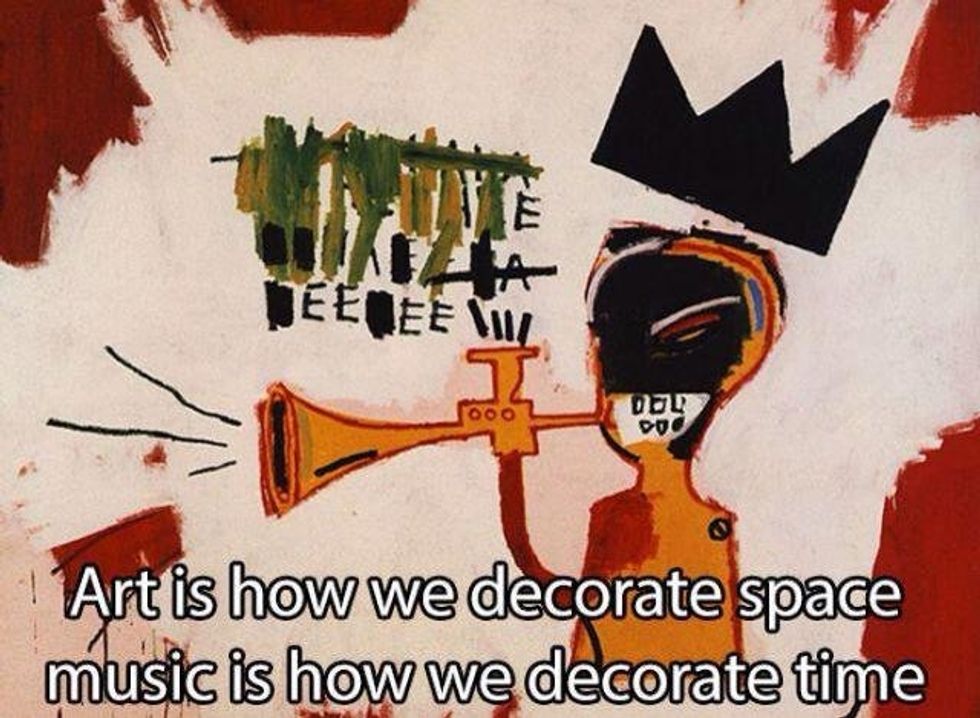During this time in our lives, millennials are experimenting with their identity, trying to construct a persona they are proud of, this generation specifically uses pop culture more than ever as a tool in this endeavor. Music is one of the many platforms that people use as a means of creating identity, resonating with lyrics that perfectly describe emotions/experiences they have had trouble processing. Deep bonds can be formed through connecting over music and communities are created amongst the fans of different genres. As Roy and Dowd state in their article, What is Sociological About Music, "Music and its meanings inform people quite profoundly about who you are…music both signals and helps constitute the identity of individuals and collectivities" (Roy/Dowd, 189). Music is now used as a tool for rallying youth of color through accurate representation of their struggles in a mainstream form of media.
On a political front, youth are once again faced with the reality that their opinions are not taken seriously by adults when they speak out against injustice. It is common practice for "grownups" to overlook younger opinions. Why break the status quo that has kept these oppressive institutions in power? Politicians especially target young people, catering to their desire to become involved with the national discourse, by making grand promises about change and then not delivering. "A dual identity has been carved out for youth as powerful consumers and a disenfranchised, oppressed minority. The realities that youth experience… reflect a culture in which the civil rights gained by previous generations have increasingly been overcome by civil rights losses" (Clay, 111). The dual reality described by Clay in his article Mobilizing Youth for Social Change, is part of the reason I attribute music as a movement gaining traction. Many scholars argue that race plays a role in social movements, while others claim that the youth can be used as a tool for mobilizing the masses. However, many scholars fail to look at the intersection of youth of color, specifically young African American males, and their forms of resistance, more particularly, hip hop.
In the song "January 28", he talks about the ongoing violence that plagues the African American community and the lack of a relatable icon for this community, one that isn't fueled by fame. "What's the price for a black man life? I check the toe tag, not one zero in sight. I turn the TV on, not one hero in sight, unless he dribble or he fiddle with mics" [verse 2]. When one thinks of a price tag, the image of a small piece of paper attached to a material object forms. An outlandish number on a price tag equates to the products overall value; the more zeros, the more significant the purchase would be. The price tag Cole refers to suggests that in our society, Black men are treated as having little to no value. Showing how an African American man can be murdered, and people brush it off as insignificant because society has told us that the value of this particular demographic of people is lesser than. Now imagine being a member of this community, watching your friends/neighbors getting murdered, and then watching the reaction of a nation that brushes these deaths off as the norm and adds this information to their data set. How is one supposed to express outrage toward a system that is already refusing to advocate for the individual? Where do you turn for validation of your pain when the only people in this demographic who are viewed highly "dribble or fiddle with mics?"
The reason that hip-hop is now used as an agent for change can be attributed to another concept Clay covers in her article: scope. She argues that "everyone is listening. Hip-hop music is doing billions of dollars now and it's just an empowerment if people can hold on to it and take it the right way" (Clay, 114). That's why it's so important for artists to understand the scope of their influence and use their media to bring societal issues to different audiences, J. Cole does this well when he continues the song with, "not talkin' bout the slums, I'm talkin' bout that mind state that keep a black nigga dumb, keep a black nigga dyin' by a black nigga gun" [verse 2]. In this snippet of the song, Cole talks about a "mind state" as opposed to outside influences that are generally talked about when scholars look at why racism is still so prevalent today. It is important to look at how social expectations and restraints affect the psyche of the young African American male. Faced with centuries of unjustified hatred that has manifested into vicious stereotypes, Black youth are not expected to be successful. Society has set a very negative image when it comes to Black males, which is what J. Cole talks about in the song. Since Black men are generally type cast as scholastically inferior to White men, it is appropriate to assume that this standard gets internalized, leading black men to actually believe they are mentally subordinate.

















